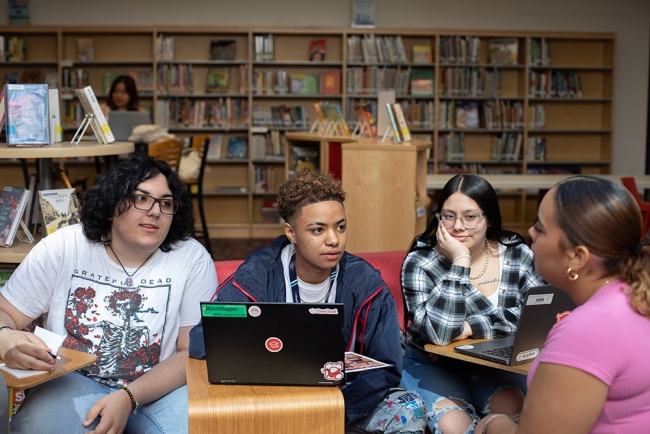You have /5 articles left.
Sign up for a free account or log in.

Nonprofits focused on college access and success, such as OneGoal, say the Education Department should “distinguish between mission-driven nonprofit organizations working to address critical educational equity gaps and for-profit companies exploiting low-income students for financial gain” as it considers new guidance for companies that colleges work with.
Courtesy of OneGoal
Nonprofit groups focused on college access and success worry that Education Department guidance expanding the definition of outside companies that are subject to the agency’s oversight could hinder their efforts to support students.
Under guidance released earlier this year, the organizations would be considered third-party servicers, which would subject them to the department’s oversight and regular audits. Historically, third-party servicers were directly involved with administering financial aid programs. The department expanded that definition to include companies involved with student recruiting and retention and providing educational content and instruction as part of an effort to increase oversight of online program managers.
That new definition would include any organization that works with a college and provides personalized financial aid counseling, advising and services to help a student stay enrolled, the organizations say.
“When you read the actual intent of the policy, it is so clear it’s not meant for us,” said Melissa Connelly, chief executive officer of OneGoal, which helps low-income and first-generation students pursue and complete a postsecondary education. “In many ways, it is fighting for a lot of the same things that we fight for around transparency, around affordable education, around accountability. These are things that we need to care deeply about as college access and success organizations.”
That guidance was revised and put on hold after a barrage of criticism about how the new definition would jeopardize certain programs and have other unintended consequences. Several higher education groups and companies that work in the industry want the guidance scrapped. 2U, a prominent online program manager that would be considered a third-party servicer under the guidance, has sued to block it.
Office of Federal Student Aid officials said at a conference last month that they expect to share a new Dear Colleague letter about third-party servicers soon. The Education Department did not respond to a request for more information about the timeline.
Whenever the new letter is released, the guidance will take effect six months after its publication.
More than 20 organizations, including OneGoal, the National College Attainment Network and Teach for America, sent a letter to the department in late June outlining their concerns.
“The department ought to be able to distinguish between mission-driven nonprofit organizations working to address critical educational equity gaps and for-profit companies exploiting low-income students for financial gain,” the letter said. “If it is not able to develop guidance that is better targeted at addressing the problem it is intending to solve, perhaps a different approach entirely is warranted.”
Without any revision to the guidance, affected nonprofits say they’ll face program audits involving a review of student files drawn at random, interviews with management and a site visit, said Anika Van Eaton, vice president of policy at uAspire, a nonprofit that helps students navigate the process of finding and applying for financial aid.
That could cost $40,000 to $50,000 for small nonprofits, said Van Eaton.
“There’s a lot of concern among ourselves and our peer organizations that this will take away from our ability to effectively do the work both in terms of staff time and in terms of creating an environment where institutions will be less likely to want to work with us,” Van Eaton said.
Catherine Brown, senior director of policy and advocacy at the National College Attainment Network, a nonprofit membership organization focused helping students prepare for and succeed in college, said the department has shown a willingness to clearly exempt certain groups or activities from the guidance such as study abroad programs and recruitment of international students.
“We think it was inadvertent, but we also think the department hasn’t figured out a way to solve it,” she said.
Brown said nonprofit organizations focused on equity and education should be exempted, especially following the recent Supreme Court decision to ban the use of race-conscious admissions.
“These are the organizations that are helping students of color, first-generation, low-income students go to and through college,” Brown said. “They’re absolutely critical intermediaries in that effort, and this is not the time to be blasting a huge administrative burden on them.”
Connelly with OneGoal said the guidance is already pulling at the organization’s resources.
“We are already having conversations with our legal counsel who are making recommendations to continue to make sure that we are prepared to be in compliance,” she said. “The second anybody says that we are going to be bucketed in that category, we need to be compliant pretty quickly. We can’t afford to just wait until more information or guidance comes.”
Connelly said she’s cautiously optimistic that nonprofits like hers would be excluded.
“When you look at the black and white, it doesn’t make sense that our organizations would be included under that umbrella,” she said. “We see that this kind of work is different. I think it’s cautiously so because it wouldn’t be the first time in our history where bureaucracy with great intent was implemented poorly and it did real harm to students.”




